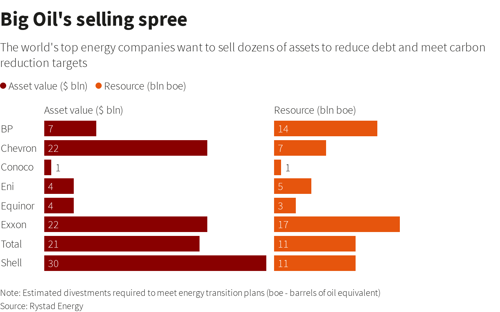Big Oil's selling spree might prove tricky
The world’s leading energy companies are hoping to sell dozens of oil and gas fields and refineries worth over $110 billion to reduce ballooning debt and their carbon footprint.
But with the outlook for oil and gas prices shrouded in uncertainty because of the coronavirus epidemic and the looming energy transition, finding buyers and agreeing on asset prices might prove tricky.
“This is not a very good time to sell assets,” Total CEO Patrick Pouyanne said while presenting the French giant’s strategy to switch to renewables energy.
Eight of the world's top oil companies - Exxon Mobil, Chevron, Royal Dutch Shell, BP, Total, Equinor, Eni and ConocoPhillips - are expected to sell in the coming years assets with resources of around 68 billion barrels of oil and natural gas equivalent, around two years of today's global demand, according to Norwegian consultancy Rystad Energy.
Those assets today carry an estimated value of $111 billion, Rystad said in a note.

Oil prices crashed to their lowest since 1999 in April after a collapse in demand caused by coronavirus-related travel restrictions around the world. They have since recovered to around $40 a barrel, but are not expected to rise dramatically in the coming years.
For buyers, this means an opportunity to snap up cheap assets. Companies that could benefit from this include smaller exploration and production firms such as Serica EnergyL, Cairn Energy and Jadestone Energy, according to Peel Hunt analysts.
Yet with a narrowing pool of buyers and banks’ growing reluctance to lend to the oil and gas sector, flogging assets could be tough.
"Oil and gas asset sales will of course put pressure on market pricing if there are few buyers for these assets," said Garrett Soden, CEO of Canadian-listed Africa Energy, which is part of Africa Oil group.
Reduced investments by the majors could however lead to tighter supply and higher oil prices in the coming years which would increase the value of their resources, Soden added.
The majors need to sell assets to boost revenues and reduce debt amassed in the wake of the oil price collapse.
European companies including BP, Shell and Total are also looking to focus their oil and gas operations on the most profitable and least polluting projects after setting out ambitions to slash carbon emissions in the coming decades.
Exxon and BP each hope to sell $25 billion of assets in the coming years, while Shell aims to dispose of $5 billion per year, for example.
Reporting by Ron Bousso; Editing by Tomasz Janowski






Comments